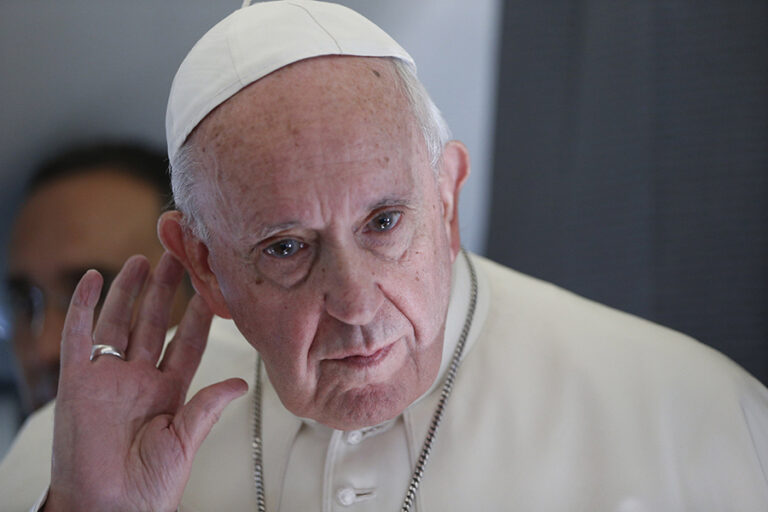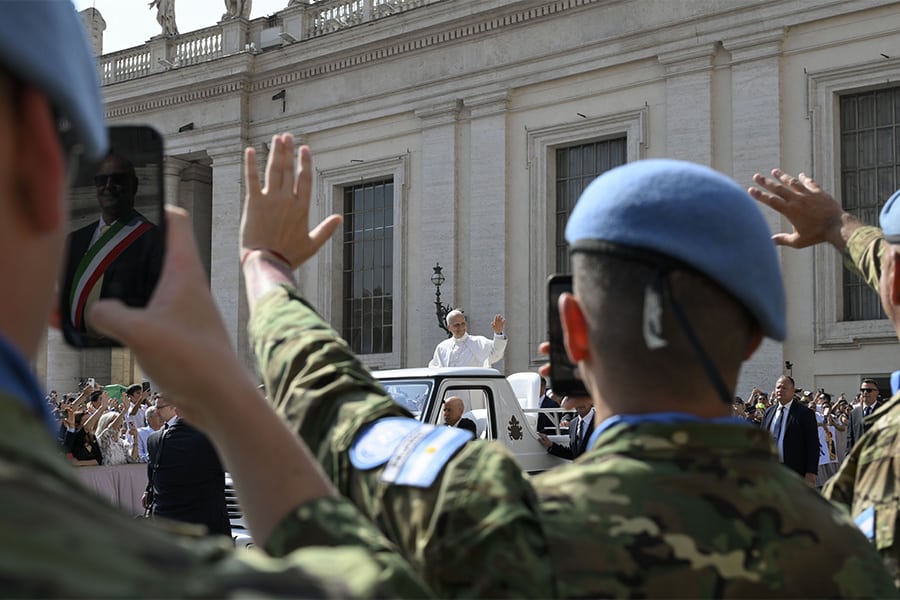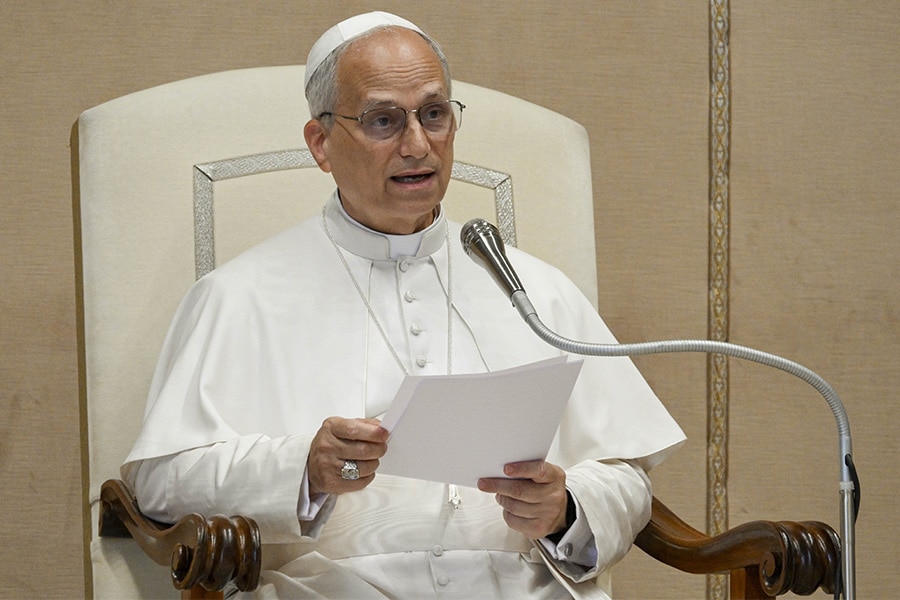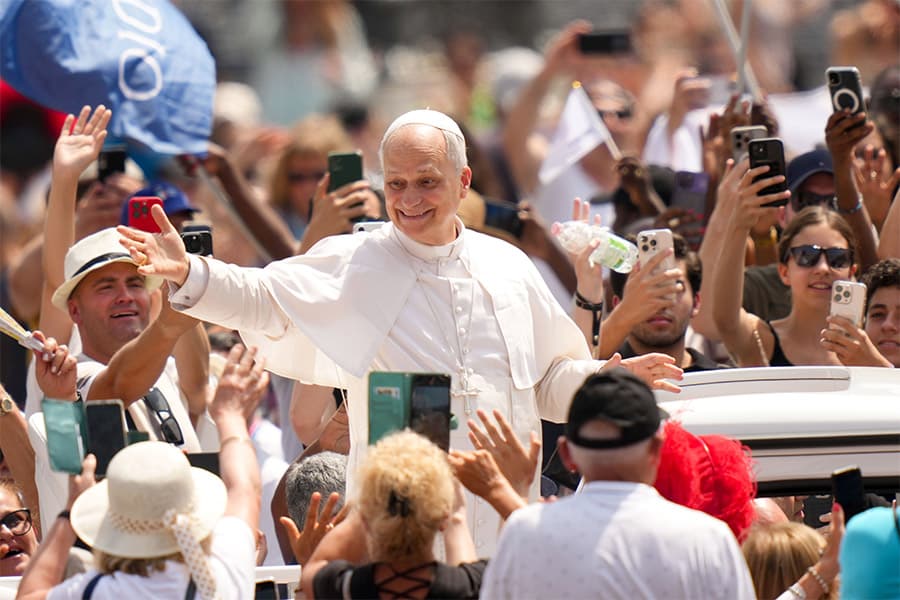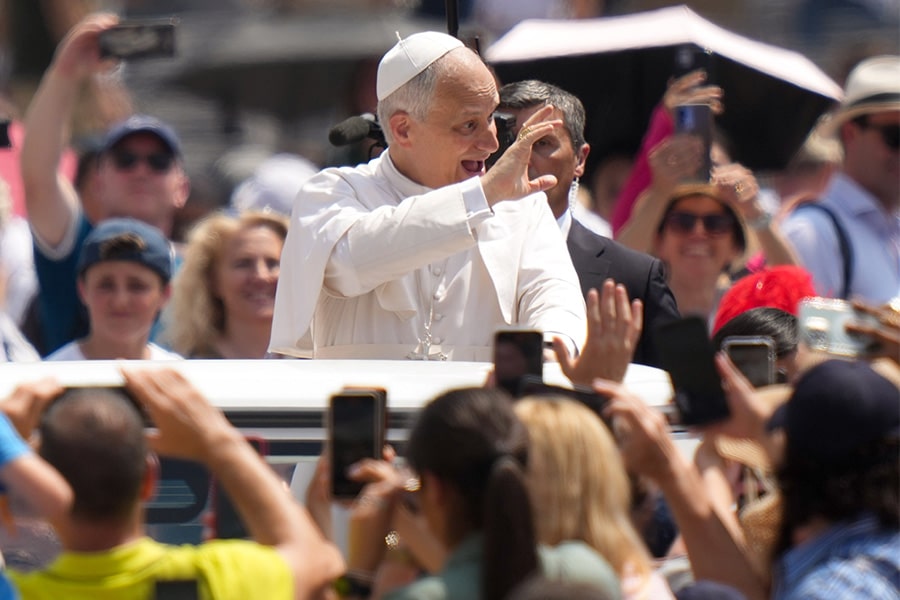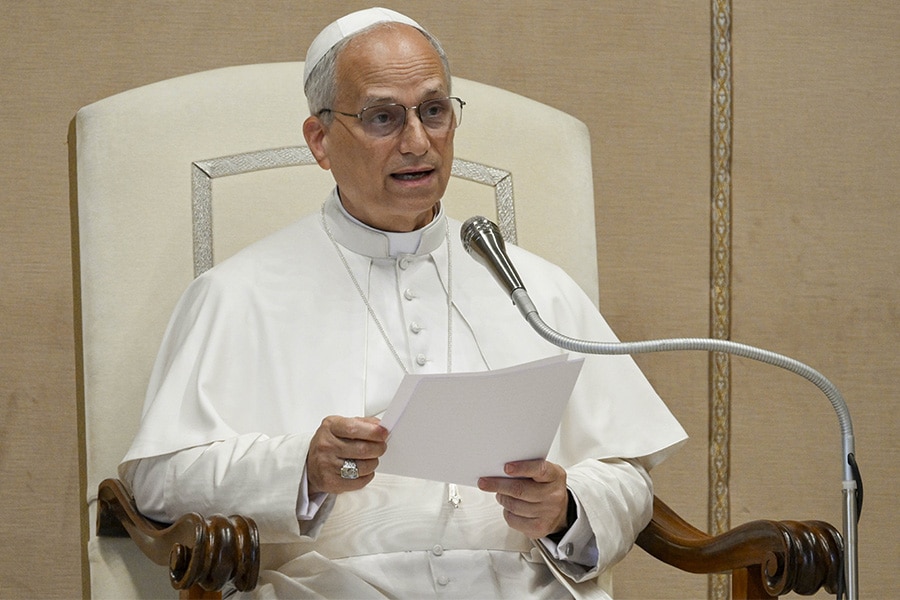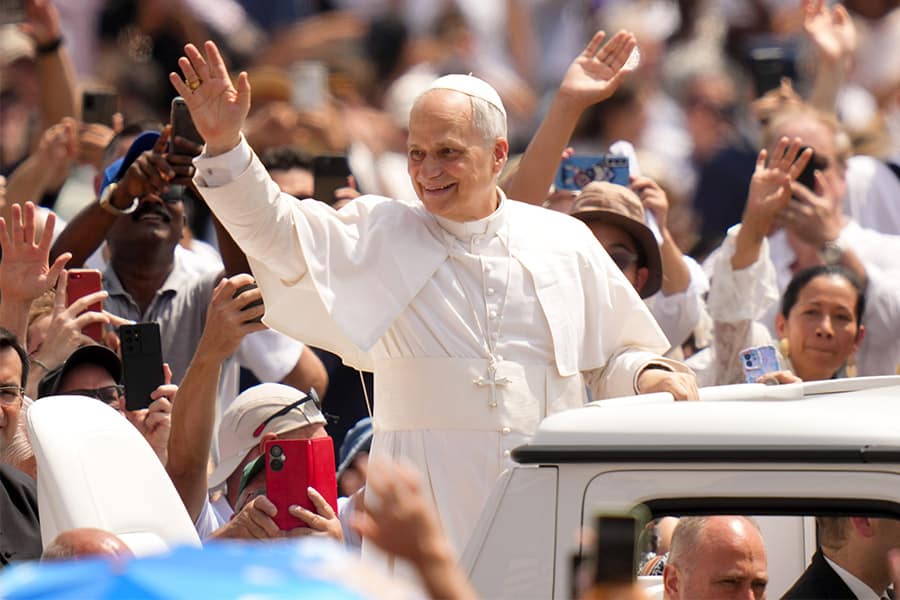Pope Francis is celebrating the 10th year of his papacy March 13. This is one in a series of stories on his decade as Pope.
VATICAN CITY (CNS) — For a decade, even when discussing the internal workings of the Vatican, Pope Francis has insisted the church is not the church of Christ if it does not reach out, sharing the “joy of the Gospel” and placing the poor at the center of its attention.
Signals that his papacy would be different started the moment he stepped out on the balcony of St. Peter’s Basilica the evening of March 13, 2013: He was not wearing a red, ermine-trimmed cape, and he bowed as he asked the crowd to pray that God would bless him.
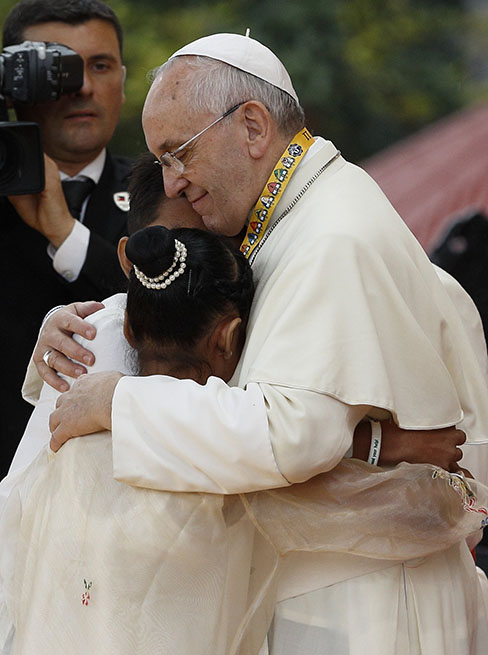
His decision not to live in the Apostolic Palace, his invitations to Vatican trash collectors and gardeners and other employees to join him for his daily morning Mass, his insistence on going to the Italian island of Lampedusa to celebrate Mass and pray for migrants who had drowned in the Mediterranean captivated the attention of the media.
But not everyone was pleased with the seeming ease with which he set aside pomp and protocol. And tensions within the Catholic community grew as he expressed openness to LGBTQ Catholics and to those living in what the church considers irregular marriage situations and when he said in an interview in 2013 that the church cannot talk only about abortion, gay marriage and contraception.
One kind of summary of his first 10 years as pope can be found in numbers: He has made 40 trips abroad, visiting 60 countries; in eight consistories he created 95 cardinals under the age of 80 and eligible to vote in a conclave and paid tribute to 26 churchmen over the age of 80; and he has presided over the canonizations of 911 new saints, including a group of more than 800 martyrs, but also Sts. John Paul II, John XXIII and Paul VI.
In his first major document, the apostolic exhortation “The Joy of the Gospel,” he laid out a program for his papacy, looking inside the church and outside at the world to see what needed to be done to “encourage and guide the whole church in a new phase of evangelization, one marked by enthusiasm and vitality.”
The document included a discussion of the need to reform church institutions to highlight their missionary role; to encourage pastoral workers to listen to and stand with the people they were ministering to — his famous line about having “the smell of the sheep”; to deepen an understanding of the church as “the entire people of God” and not as an institution or, worse, a club of the elect; to integrate the poor into the church and society, rather than simply see them as objects of assistance; and to promote peace and dialogue.
For Canadian Cardinal Michael Czerny, prefect of the Dicastery for Promoting Integral Human Development, the agenda of Pope Francis is the original agenda of the Second Vatican Council.
Unlike St. John Paul II and the late Pope Benedict XVI, Pope Francis did not attend any of the council sessions. And, in fact, because he was ordained to the priesthood Dec. 13, 1969, he is the first pope to be ordained a priest after Vatican II.
“After Scripture and tradition, the council is the significant foundation, and I would say, characteristic orientation of this papacy,” the cardinal told Catholic News Service. “He has taken the council not from a collection of decrees, but from the lived experience of the council as implemented, as lived, as tested, as developed, you might say, in the church of Latin America.”
St. John XXIII launched the council with a pastoral focus on what it means to be the church in the modern world, he said. The papacies of St. John Paul and Pope Benedict, he said, “reverted to a more doctrinal understanding of the council” with “some very good results and with some massive, unfinished business.”
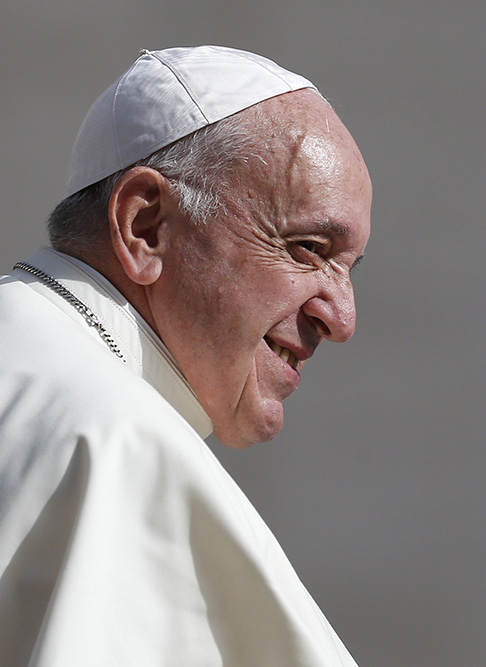
While the work of Pope Francis’ predecessors was important, he said, “I don’t think it picked up the primary agenda (of the council), which was implementing a new understanding of church in the modern world, a new way of evangelizing because the world is so different from how it was, let’s say, at the end of World War II.”
Emilce Cuda, an Argentine theologian and secretary of the Pontifical Commission for Latin America, agreed that a key to understanding Pope Francis’ pontificate is knowing how Vatican II was lived in Latin America with respect for popular piety and culture, and trust in the “sensus fidei,” the notion that the baptized together have a “sense of faith” and an ability “to understand what God says to us, to his people, in every moment.”
“There in the popular culture, in the peripheries, and in all the people of God, we can hear what God wants from us, or what God tells us to do in response to social problems and in the church in each moment,” she said. “We are in history and history is a movement, and the situation is not the same (as) in the 20th century or in the 21st century.”
As for disagreements with or even controversies about the papacy of Pope Francis, Cardinal Czerny warned against confusing “loud with representative or loud with majority. Loud doesn’t mean any of those things; it means loud.”
But, he said, “the patience of Pope Francis” leads him and encourages others to recognize that the pope’s critics “are not 100% off beam,” or off track; there usually is a grain of truth in what they say or an important value they hold dear that is being overlooked.
Cardinal Joseph W. Tobin of Newark, N.J., said he believes the first 10 years of Pope Francis’ pontificate have been preparation for “what’s happening right now, and that’s the synodal conversation.”
The Second Vatican Council called Catholics to read the “signs of the times” and respond. And, the cardinal said, “this notion that we don’t have automatically prepared prescriptions for every challenge that faces us leads us to a fundamental tenet of our belief,” which is belief “in the Holy Spirit, the lord and giver of life.”
The synod process, which began with listening to people around the globe and will move toward two assemblies mainly of bishops, is about listening to the Holy Spirit.
While the synod involves meetings, Cardinal Tobin said, “synodality is a way of being church. It’s an ancient way of being church that is being recovered and lived in the circumstances in which we face ourselves today. And so, to my mind, that’s sort of the capstone of what Pope Francis has been working for over the last decade.”
“I’ve called synodality his long game,” the cardinal said. “He’s convinced that the changed circumstances of our world and our world going forward demand a new appreciation for the role of the Holy Spirit and a way to access that gift that is given to all of us by virtue of our baptism.”
Pope Francis has been laying the foundation for the new synod process since the beginning of his pontificate, said Cardinal Blase J. Cupich of Chicago. “There’s an organic whole to all of this.”
“I just wonder if, from the very beginning, he had in his mind that this would be the trajectory of his pontificate, and the synod on synodality I think is, in some way, the opportunity for him to pull everything together,” he said. “There are people who want him to go faster, but he wants things to be held together and the church to be held together.”
Asked what he thought was the most significant aspect of Pope Francis’ pontificate, the cardinal cited his predecessor, the late Cardinal Francis E. George, who participated in the 2013 conclave, and said the best description of Pope Francis was “He’s free.”
“He’s free in the sense of wanting to listen to different voices in the life of the church,” Cardinal Cupich said. “He’s free in being imaginative, but also he has the kind of freedom that really allows him to be joyful in this ministry.”
“John Paul II told us what we should do. Benedict told us why we should do it. And Francis is saying, ‘Do it,'” the cardinal said. Pope Francis is leading by example in how he cares for the poor, sees God at work in people’s real lives and reaches out to people often overlooked by the church.
“I think history will look back on this pontificate as historic, as pivotal in the life of the church,” Cardinal Cupich said.
Read More Vatican News
Copyright © 2023 Catholic News Service/U.S. Conference of Catholic Bishops

